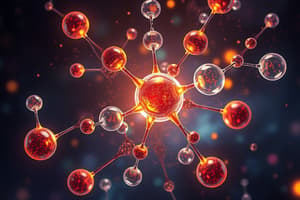Podcast
Questions and Answers
What is the primary focus of Organic Chemistry Mastery (O.C.M)?
What is the primary focus of Organic Chemistry Mastery (O.C.M)?
- Exploring the history of inorganic chemistry
- Analyzing the behavior of metals
- Studying carbon-based molecules and their reactions (correct)
- Investigating quantum physics in chemistry
Who is credited with the groundbreaking synthesis of urea from inorganic compounds in 1828?
Who is credited with the groundbreaking synthesis of urea from inorganic compounds in 1828?
- Louis Pasteur
- Hermann Emil Fischer
- Friedrich Wöhler (correct)
- Marie Curie
What misconception was dispelled by Friedrich Wöhler's synthesis of urea?
What misconception was dispelled by Friedrich Wöhler's synthesis of urea?
- Inorganic compounds are more reactive than organic compounds
- Organic and inorganic compounds are identical
- Organic compounds are only derived from living organisms (correct)
- Carbon-based molecules cannot undergo chemical reactions
Which scientist spearheaded the development of the structure theory in organic chemistry?
Which scientist spearheaded the development of the structure theory in organic chemistry?
In what century did German scientists begin efforts to identify and synthesize organic compounds?
In what century did German scientists begin efforts to identify and synthesize organic compounds?
How does organic chemistry contribute to drug development?
How does organic chemistry contribute to drug development?
What role do organic polymers such as plastics play in materials science?
What role do organic polymers such as plastics play in materials science?
Why is nomenclature important in organic chemistry?
Why is nomenclature important in organic chemistry?
What are functional groups in organic chemistry?
What are functional groups in organic chemistry?
Why are reaction mechanisms important in organic chemistry?
Why are reaction mechanisms important in organic chemistry?
What happens in an elimination reaction in organic chemistry?
What happens in an elimination reaction in organic chemistry?
What is the significance of addition reactions in organic chemistry?
What is the significance of addition reactions in organic chemistry?
Study Notes
Introduction to O.C.M (Organic Chemistry Mastery)
Organic Chemistry Mastery, or O.C.M for short, is an expansive field within organic chemistry that encompasses the study of carbon-based molecules and their reactions. This discipline is integral to understanding the complexities of life, materials science, and pharmaceuticals. In this article, we'll delve into the foundations and key aspects of O.C.M, exploring its history, importance, and some of the fundamental concepts and tools.
A Brief History
Organic chemistry originated from the efforts of German scientists in the 18th and 19th centuries to identify and synthesize organic compounds, which were previously thought to be solely derived from living organisms. In 1828, Friedrich Wöhler's groundbreaking synthesis of urea from inorganic compounds demonstrated that organic compounds could also be produced through more general chemical processes. The development of the structure theory in the late 19th century, spearheaded by Hermann Emil Fischer, laid the foundation for the modern understanding of organic chemistry.
Importance and Significance
Organic chemistry has immense significance in various realms. For instance, it plays a pivotal role in the development of pharmaceutical drugs, identifying specific organic compounds that can interact with biological systems and thus cure or treat diseases. Additionally, organic chemistry contributes to the advancements in materials science, with organic polymers such as plastics and resins finding applications in numerous industries.
Fundamental Concepts
Nomenclature
Nomenclature is a vital aspect of organic chemistry, as it provides clear and unambiguous names for molecules. This enables chemists to communicate effectively and understand the structures of compounds. The International Union of Pure and Applied Chemistry (IUPAC) provides guidelines for organic chemistry nomenclature.
Functional Groups
Functional groups are specific groups of atoms within a molecule that impart characteristic chemical and physical properties. Examples of functional groups include alcohols (-OH), aldehydes (-CHO), and carboxylic acids (-COOH). The presence and type of functional groups in a molecule allow chemists to predict its reactivity and behavior in various reactions.
Reaction Mechanisms
Understanding reaction mechanisms, or the step-by-step processes that occur during a chemical reaction, is crucial in organic chemistry. Mechanisms provide insights into the factors that control reaction rates, selectivity, and overall efficiency. A classic example of a reaction mechanism in organic chemistry is the SN2 (substitution nucleophilic bimolecular) reaction, which involves the substitution of a leaving group by a nucleophile.
Organic Reaction Types
Organic chemistry is replete with various reaction types, each with its distinct characteristics and applications. Some of the most common organic reactions include:
- Substitution reactions: Reactions that replace an atom or group in a molecule with another atom or group.
- Elimination reactions: Reactions that result in the removal of a molecule (usually a leaving group) from a molecule.
- Addition reactions: Reactions that involve combining two or more molecules by forming new bonds.
- Condensation reactions: Reactions that produce smaller molecules by combining two or more larger molecules, eliminating a small molecule (such as water).
Conclusion
Organic chemistry, with its vast array of concepts, principles, and techniques, offers a deep, multifaceted exploration of carbon-based molecules and their reactions. By understanding the fundamental aspects of O.C.M, students and professionals alike can advance their knowledge and applications in the fields of chemistry, biological sciences, materials science, and pharmaceuticals. The beauty of organic chemistry lies in its complexities and the numerous ways it contributes to solving real-world problems.
Studying That Suits You
Use AI to generate personalized quizzes and flashcards to suit your learning preferences.
Description
Test your knowledge of fundamental concepts in Organic Chemistry Mastery (O.C.M), including nomenclature, functional groups, reaction mechanisms, and organic reaction types. Explore the key aspects of O.C.M and enhance your understanding of carbon-based molecules and their reactions.




